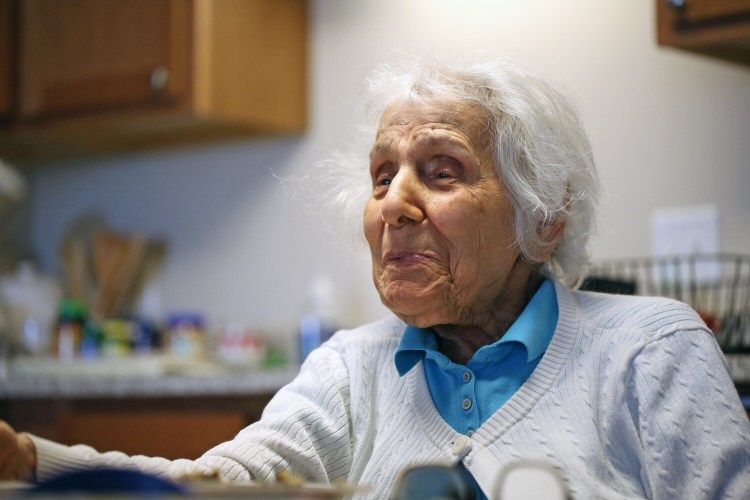You get to meet all sorts of amazing people as a reporter, and you get to enter their world, even if briefly. It’s one of the great joys of reporting, and it’s a big piece of what hooks you and keeps you going through deadlines, and more deadlines.
One of the people I was lucky enough to meet through my writing at the Portland Press Herald was Kareemi Atallah, at the time a 102-year-old woman of Lebanese descent who lived in South Portland. I met her because she read something I’d written in the newspaper about Lebanese food and called me up to say how much she missed her mother’s cooking.
Kareemi – I am going to break newspaper protocol here and call her by her first name – died last Sunday, according to an email I received from her son, Tom Benzel, the next day. She was 103, 103½ she would have said. You can’t really be sad at the death of someone who lives to 103. That’s more than most of us get. As her son wrote me, “She’s definitely lived a long and full life.” Still, as he also wrote me, “we will miss her.”
When I met her, Kareemi told me about a business she’d run from her home in South Portland in the 1980s and ‘90s selling Lebanese food. This was before Nura, before Evo, before Olive Cafe, before Baharat, before Tiqa, before Yottam Ottolenghi and before hummus (which she made and sold) was unhitched from its Middle Eastern origins and became as American as bagels or pizza.
Kareemi was a pistol – funny, fun and oh so sharp. At 103, she still did tough puzzles with hundreds of pieces, read this newspaper with acuity and curiosity, flirted with a newspaper photographer many decades her junior, joked with pointed wit and seemed to remember everything about our conversations. She could walk, march really, the length of Sable Lodge Retirement Community, where she lived the last few years of her life, to give me a tour of the place and to introduce me to her friends. Whom, as soon as we’d said goodbye to, she’d gossip about, though never unkindly.
She collected Middle Eastern cookbooks and camels. One visit she insisted that I take home a small stitched leather camel, because she didn’t like to think what might happen to it when she was gone if nobody wanted it. He’s parked at the base of my computer now.
The last time I spoke to Kareemi was on Easter, when she called to wish me a good holiday. I promised to consult my calendar and phone her back to make a plan to get together, which we did too infrequently. That was my fault, and I have spent the whole day since I learned of her death deeply regretting it. I was always waiting for the week when I would magically have lots of free time, even though I knew time was running out for her.
Kareemi had a daughter who predeceased her, and whom she missed terribly. Her voice caught whenever she talked about her. I am taking comfort in picturing them together again. They are sharing a meal of za’atar-dusted pita; fattoush, the recipe I printed in the newspaper that first caught Kareemi’s eye; and mujadara, a homey Lebanese lentil dish I tried to cook for her once (mistake! It wasn’t up to snuff, and Kareemi didn’t beat around the bush when she let me know). Mother and daughter are reunited, and grandmother – Kareemi’s mother – is doing the cooking.
Send questions/comments to the editors.



